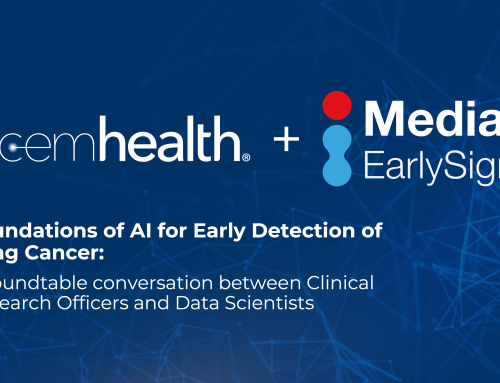
From Data to Decision: How AI Streamlines Early Identification of those at Highest Risk of Progression from Prediabetes to Type 2 Diabetes
Introduction
The adoption of artificial intelligence (AI) and machine learning has the potential to transform early detection of disease progression for diabetes if applied correctly. AI solutions can identify those at a higher risk for progressing from prediabetes to type 2 diabetes (T2D) much earlier than current approaches, enabling preventive interventions before onset of disease.
The Growing Burden of Prediabetes
Prediabetes is a serious precursor condition where blood sugar levels are elevated but not yet high enough to be diagnosed as full-blown type 2 diabetes. According to estimates published by the Centers for Disease Control and Prevention (CDC), a staggering 96 million American adults—more than 1 in 3—are currently living with prediabetes. [1] Without lifestyle interventions and education, this progression can substantially raise risks of heart disease, stroke, kidney failure, blindness, lower limb amputation and other major complications.
Current screening approaches rely primarily on sporadic blood tests or simple paper-based risk factor assessments. More advanced and proactive approaches leveraging AI predictive analytics are urgently needed to identify prediabetic patients at a higher risk of progressing to diabetes in the near term, when prevention efforts can have the most effect.
The Many Benefits of Early Detection
If applied successfully, AI-powered early detection of prediabetes progression risk can yield benefits for patients, providers, and health systems including:
- Patients have better long-term health outcomes through earlier use of lifestyle interventions to reduce downstream impact on diabetes. [2]
- Health systems and insurers reduce the costs of treating diabetes complications, including dialysis, heart attacks, blindness, and amputation.
- Physicians can optimize use of limited care resources and time by focusing prevention efforts on the higher-risk individuals.
Early Detection of Prediabetes Progression: Applying Advanced Predictive AI Models
Medial EarlySign helps healthcare stakeholders keep patients healthier longer—with software solutions that derive actionable and personalized clinical insights from readily available health data. EarlySign’s AI algorithms and predictive solutions can help healthcare organizations select enriched sub-populations and more accurately identify and prioritize patients for interventions for multiple conditions to halt or prevent serious complications from the onset of disease.
Working with health systems on a global level, this model was developed to leverage the predictive power of EarlySign’s clinical machine learning solutions to reduce the human and financial cost of diabetes. With input from clinical and population health leaders, this model was developed to identify prediabetics at high risk of progression to type 2 diabetes. While primary prevention of diabetes with lifestyle intervention programs and / or medications has been shown to be of benefit, cost and medication side-effects inhibit widespread support and deployment of these programs. EarlySign’s algorithm enables stratifying the large pre-diabetes population by risk of progression to diabetes in the near term, enabling selective implementation of interventional programs to those who need them most.
Early Detection of Prediabetes Progression – Improved Screening Resource Allocation
Reveal for Prediabetes Progression allows health systems to reduce progression to Type 2 Diabetes with only a third of the effort of traditional efforts.
Consider an example health system with a population of 10,000 adult patients. If a health care organization were to apply the Reveal for Prediabetes Progression, which targets the 3% of prediabetic patients who appear to be at higher risk of progressing to Type 2 Diabetes in the next 12 months, there would be 300 patients identified to be treated. If they took that same population and ran screening without Reveal for Prediabetes Progression, they would have to engage nearly 1,100 patients (3.7x more) in diabetes prevention programs in order to have the same impact.
Beyond the clinical benefit provided by Reveal for Prediabetes Progression, , we also see significant financial benefit. If we look at the same example above through a financial lens and focus on the 300 highest risk patients, there would be an estimated savings of $259,000 over three years. (These rates and ROI will vary depending on the organization.). In contrast, untargeted interventions would have more diluted effects, and therefore the cost of treatment may nearly equal the savings from diabetes prevention.
Scaling AI Insights Across Patient Populations with Prediabetes Detection Solutions
Medial EarlySign sought to scale the availability of their prediabetes progression algorithm to benefit as many people as possible. As a result, they looked toward the expertise of Lucem Health to take deployment, care management support, and continuous improvement of advanced clinical AI solutions to the next level. Lucem’s Reveal framework makes it possible to achieve implementation scale for the prediabetes progression algorithm and enhance its benefit to users through Reveal’s outcomes tracking capabilities.
“The success of any clinical predictor or insight is predicated on its successful integration into any clinical workflow and its implementation must support and enhance rather than disrupt or change existing clinical efforts,” commented Ori Geva, EarlySign co-founder and CEO. “Together with our data science and model development experts and Lucem’s expert clinical implementation and technology team. we work quickly to deploy a platform-based solution with minimal disruption, designed for easy adoption and low-touch IT footprint, enabling rapid integration EHRs and care management workflows.”
The Bright Future of AI in Diabetes Prevention
As more rigorous real-world evidence accumulates and the human and financial toll of diabetes increases, we can expect to see greatly accelerated adoption of AI analytics to drive earlier prediabetes risk stratification across health systems in both the US and worldwide. With continual advances in clinical machine learning, increased physician experience with AI capabilities, and a regulatory environment promoting innovation, these technologies can help prevent the onset of diabetes at scale through proactive, preventive, and personalized care.
AI predictive modeling from existing patient data can identify prediabetes progression risk earlier and enable preventive interventions before irreversible disease progression. Continued innovation in AI-powered early detection can transform outcomes, even for healthcare’s toughest challenges.
Note: This is part of a larger blog series for early disease detection developed in collaboration with our model developer partner, Medial EarlySign. Stay tuned for additional blog posts that dive into early detection of diabetes and colorectal cancer in the coming weeks! You can find last week’s post, here.
